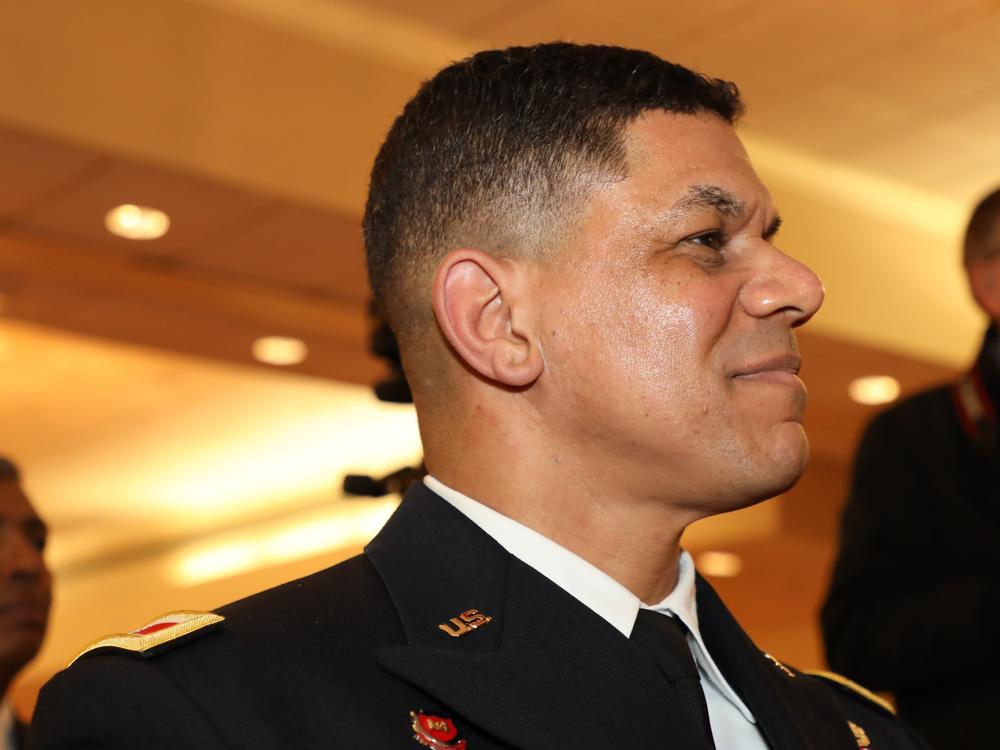Section Branding
Header Content
'It's Going To Be Hard': A New West Point Leader On Confronting Extremism In Military
Primary Content
Brig. Gen. Mark Quander is taking a new leadership role at the prestigious military school of West Point at a time that the spotlight has returned to the problem of extremism in the military.
Quander was appointed last month to be the next commandant of cadets, equivalent to a dean of students. Many graduates of West Point go on to leadership roles in the military.
"It's hard and it's also very challenging," Quander tells Michel Martin on All Things Considered about confronting extremism. "Because I think if it was easy, we would have fixed it a long time ago. But I do think that everyone is committed to addressing it."
About 15% of people arrested for storming the U.S. Capitol had a military background, an NPR analysis found, higher than in the normal population. A Military Times survey in 2019 found that more than a third of active-duty troops said they had witnessed examples of white nationalism and racism in the military recently.
Defense Secretary Lloyd Austin last week ordered a military-wide "stand down" for commanders to discuss the "corrosive effects" of extremist ideologies.
For Quander, who is Black, a December 1995 incident at Fort Bragg was a formative experience. Three soldiers with neo-Nazi ideologies from the elite 82nd Airborne Division were involved in the murder of two Black pedestrians in nearby Fayetteville, N.C. Prosecutors said the man who pulled the trigger did it as part of a rite of membership for a racist group.
Austin was a lieutenant colonel at the time, overseeing operations for the 82nd Airborne Division.
Quander arrived at Fort Bragg just two months later, in February 1996.
"2nd Lt. Quander shows up to his first unit," Quander recalls, "and this is the atmosphere in the 82nd Airborne Division at the time. Where we have these soldiers who no one knew expressed these views and now we're having to address it and deal with it."
He says leadership is now "all committed to making sure that this doesn't exist in our formations and that we're treating everyone with dignity and respect. And it's about caring for our fellow soldiers and making sure that these views and those folks express those views aren't serving in our military. But it's going to be hard."
Quander notes that his parents were living in Fayetteville in 1995. His family has a long military history. His extended family is the only Black family to produce four general officers in the U.S. military, according to the U.S. Army Corps of Engineers.
Quander's extended family is also believed to be the oldest documented African American family in the U.S., with roots going back to at least 1684. Nancy Carter Quander was formerly enslaved by George and Martha Washington at Mount Vernon.
Quander says he thinks about the family history "now more than I thought about it probably ever in any other time before. And it's because I have a much greater appreciation of history and where we've come from and those lessons that we learned from history so that we don't repeat them."
His family is also front and center when it comes to his thinking about his job at West Point, which he will start this spring or summer.
"For me, it's personal because we're continuing the tradition" of family military service, he says. "My niece is up there right now and she'll be a senior next year, or 'firstie.' And so for me, now there's another personal connection to making sure that we can develop leaders of character to serve our nation."
Kalyani Saxena and Tinbete Ermyas produced and edited the audio interview.
Copyright 2021 NPR. To see more, visit https://www.npr.org.

